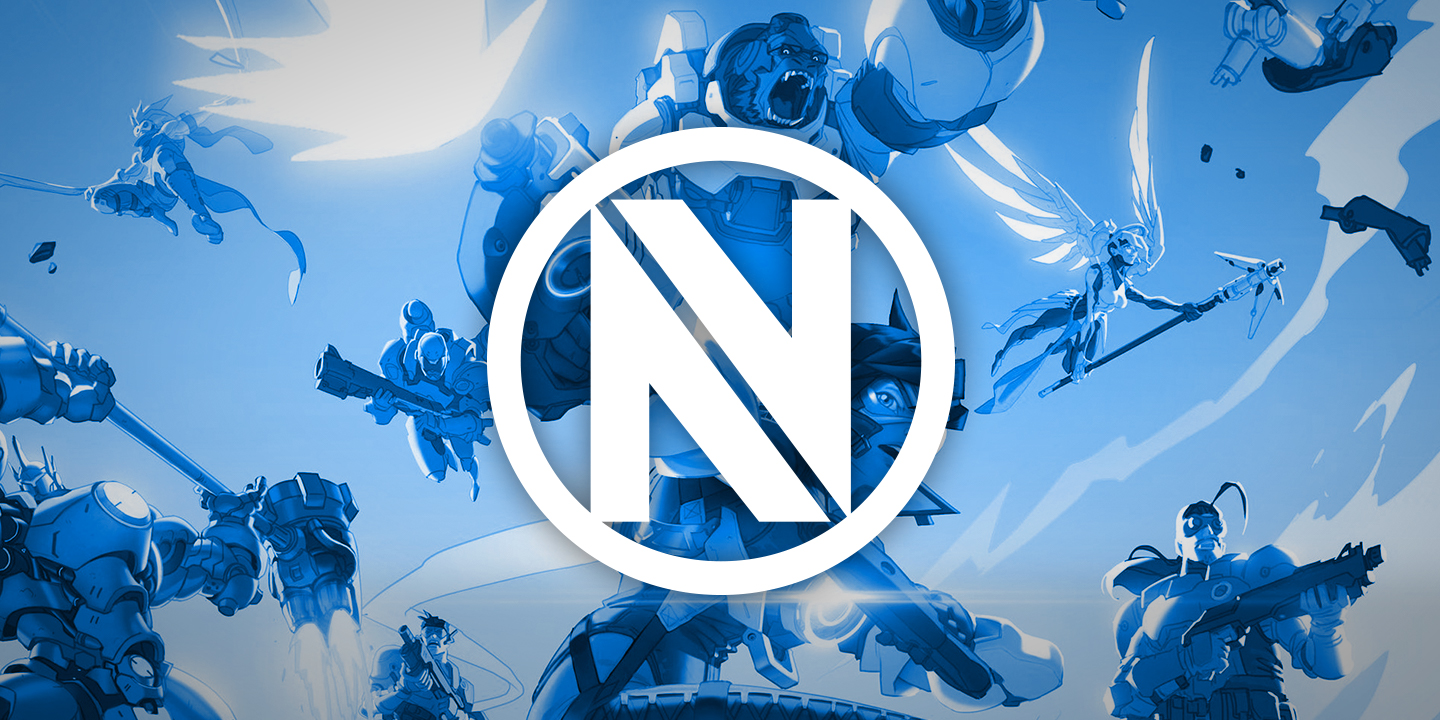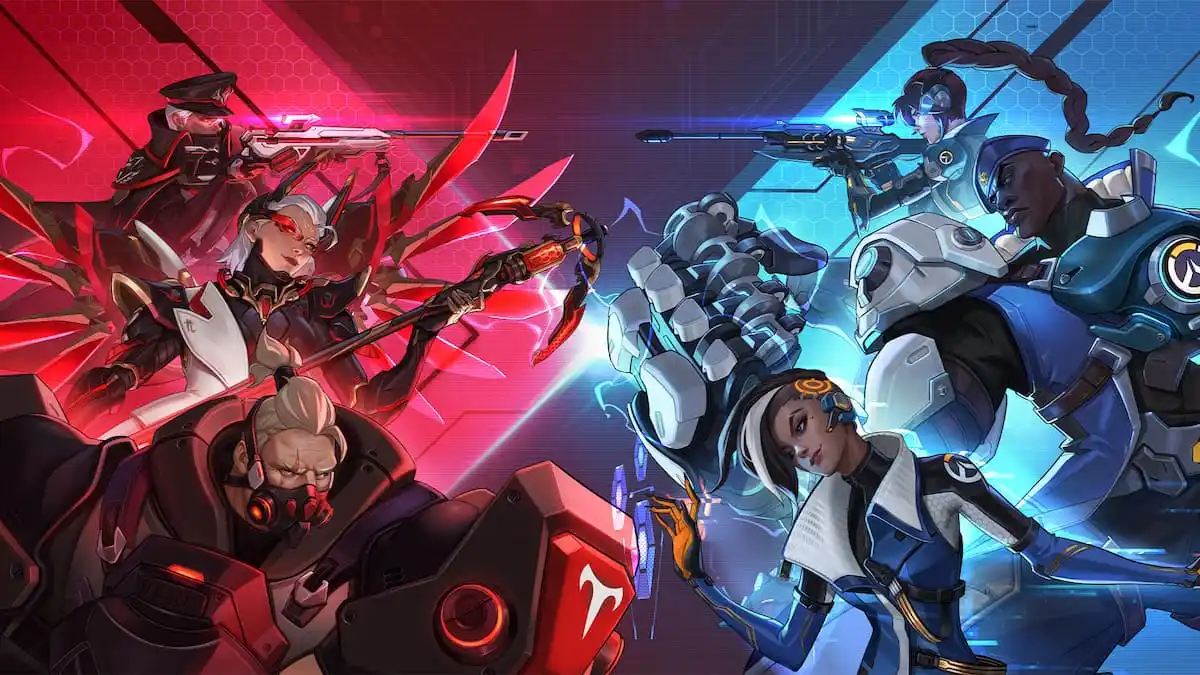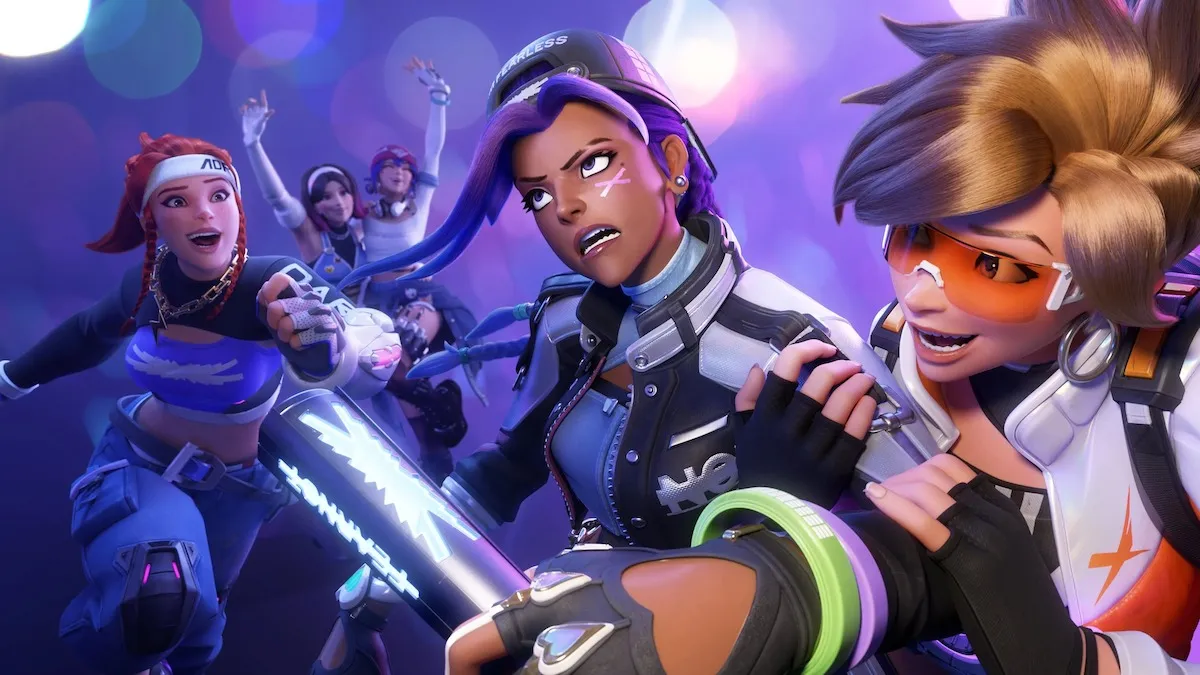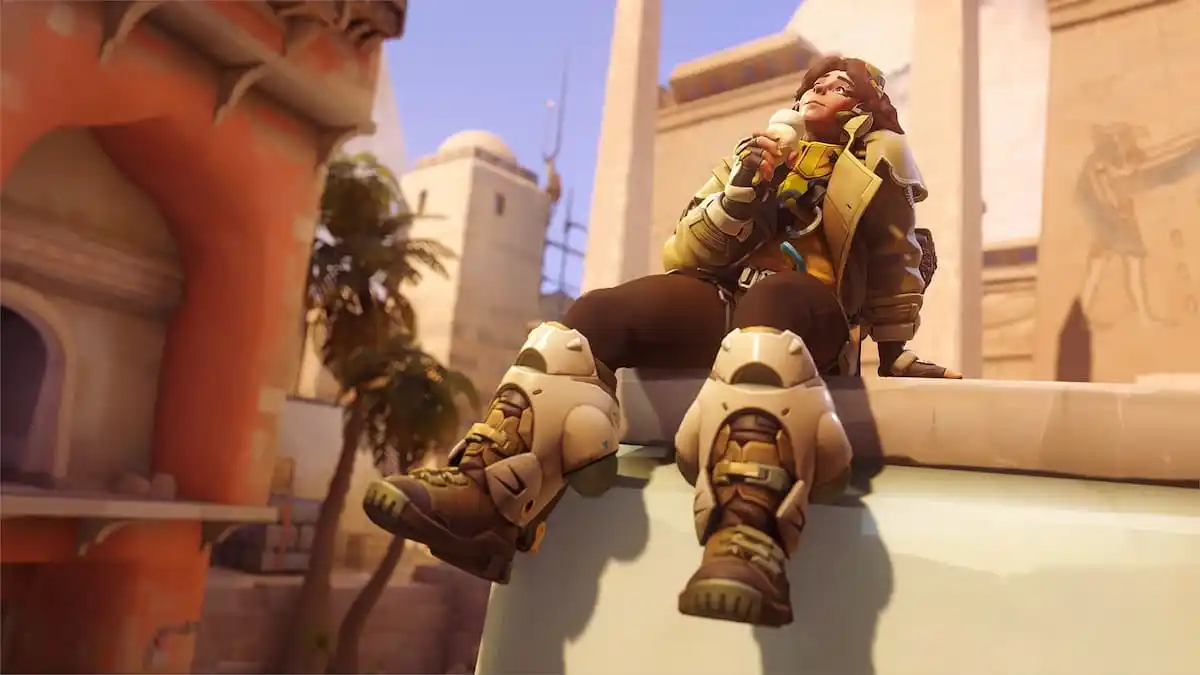The first week of the Overwatch beta, like any big game release, featured a race to the top of Twitch. The most popular channels were mostly big-name streamers who already had big fan bases and were lucky enough to grab access to the exclusive beta. But a handful of other players managed to gain attention, whether through timing, luck, or their own individual skill.
Ronnie “Talespin” DuPree fit in the latter category, a talented player who made a name for himself playing Shootmania, placing second in the $100,000 launch tournament in 2012.
Now he was preparing for his next competitive endeavor, hoping to build a Twitch audience while building a team, scrimmaging against another tentative team with a lineup featuring three Quakecon champions, including Tim “DaHanG” Fogarty, a veteran of top esports franchise Evil Geniuses.
A couple hundred fans tuned in, mostly excited to watch those Quake pros showcase their prodigious skill in a game that could provide a bigger stage than the niche dueller. But it was DuPree and his partner in crime, Matt “Coolmatt69” Iorio, who were putting on a show.
After a particularly impressive spree on Overwatch’s figurehead Tracer, one of DuPree’s thoroughly impressed Twitch viewers threw a question to his Twitch chat, “Who are these guys?”
Another user quickly piped up: “They’re the dead game gods.”
The Dead Game Gods
When the Overwatch beta first went live, it was a call to arms for many shooter players. Gamers devoted to competition in titles like Quake, Team Fortress 2, Wolfenstein, Tribes, and many other failed esports franchises flocked to the game, hungering for a game that could serve as a competitive outlet and develop a robust esports scene.
Hubris, a squad headlined by DuPree and Iorio, won six of the seven events they played during the brief one-month beta session at the end of 2015. They parlayed that success into a deal with Team EnVyUs, a huge American esports franchise with roots in Call of Duty that has since expanded to other titles, including a world-class French Counter-Strike team.
EnVyUs signed the crew ahead of what it hopes will be a big year for Overwatch as an esports title. The new EnVyUs squad is now a salaried team in a game that isn’t even out of closed beta.
Transferring to Overwatch was almost routine for these vets, and it’s hard to see any new talent on the horizon challenging their combination of skill and experience. But none of their previous games were big esports titles. None had huge fanbases and thousands of viewers. For shooter players who don’t enjoy the squad-based hitscan-centric gameplay of games like Counter-Strike and the faster-paced Call of Duty, there hasn’t been a title to scratch a competitive itch since Quake and other original esports titles died off.
Overwatch has the promise to do just that. Released in the Twitch era, backed by a developer like Blizzard, it’s the game teams like Hubris have been waiting for, a chance to turn pro gaming from dream to reality.
For Michael “ras” Penna, 24, Overwatch could be the opportunity to finally do what he’s been itching to for over eight years of competitive gaming. Penna, an IT solutions technician, recently moved with his girlfriend from Seattle to the center of esports in North America: Los Angeles.
“I feel like trying to be a pro gamer is definitely something I’d like to do, but there just hasn’t been a game I’ve been able to pursue it in obviously,” Penna said. “I feel like for a lot of people Overwatch is the last hope, really.”
Penna has opted not to find new work in Los Angeles, instead focusing on competing in a game that could be his best last chance to turn his competitive gaming hobby into a career, something that’s never been possible before but seems tantalizingly realistic now.
Esports as a career
Esports is a young man’s career. Some say that’s because declining reflexes prevents even players in their mid-twenties from competing at the top level. Others claim that societal pressures get in the way, causing players’ dedication to wane as they’re confronted with the realities of a profession that doesn’t pay the bills unless you’re not only near the top, but at it. Maybe a player wants to get married, start a family, live a different lifestyle. Maybe players just get burnt out after a few years competing in a high-stakes, high-pressure environment, working 10 plus hours a day, living in close proximity to teammates under the microscope of tens of thousands of fans ready to pounce on every little mistake. A rare few players carry that passion for three, five, 10 years, but most seem to drop out young.
Many of the players competing in Overwatch so far are older on the pro gaming spectrum. Penna is 24 years old, and he’s the youngest member of Hubris. The team’s biggest rival, Not Enigma (which I play for), fields one 23-year-old, with the rest closer to 30. To put that in perspective, every EnVyUs Overwatch player is older than every player on their championship winning Call of Duty and Counter-Strike teams.
In many ways, that’s no surprise. The players competing in Overwatch haven’t expended their esports passion, even if they’ve been competing in a variety of titles for years. They’ve been saving it up, waiting for the perfect time to strike.
“Our passion does lie with gaming,” Penna said. “If given the opportunity, the right situation, we would pursue it as a career. It’s kind of a once in a lifetime thing we want to do. We’ve played games competitively throughout our whole life and it’s something we’d want to do.”
“If given the opportunity, the right situation, we would pursue it as a career. It’s kind of a once in a lifetime thing we want to do.”
For Penna and Dan “Chump” Tousenard, the founder of Hubris, it’s “more ambiguous,” he says. Both are working careers that make it tough to drop everything to focus on competition when there are no guarantees of a payoff. Will Overwatch really be a big esport? How much money will Blizzard devote to Overwatch? The company has already committed more than $4.5 million to Heroes of the Storm, a game that will likely be smaller than Overwatch, as it competes in the far more packed multiplayer online battle arena (MOBA) genre.
When does working a job become too prohibitive towards staying at the top?
“At the end of the day, everyone’s situation is different,” Penna said. “You kinda gotta put food on the table.”
Signing with EnVyUs certainly made Penna’s decision a little easier. The players receive a decent salary with a bonus for winning tournaments, something they believe they will do. When Penna was having trouble finding an apartment in the SoCal area, he had the EnVyUs deal as a backup plan. But now he’s settled, and he’s focused on pro gaming—he’s left his job behind.
“What’s going to be better than this?” Penna said. “Bigger than this? All we can hope is that Blizzard will make the right decisions and support the competitive community.”
Beginnings of Hubris
Penna, who grew up playing games like Goldeneye and Quake 3 Arena with his brother and friends, began to realize there was a competitive side to one of his favorite hobbies in 2007. That year saw the launch of big games like Team Fortress 2 and Call of Duty 4, but Penna found himself playing Quake Wars: Enemy Territory instead. (“It had Quake in the name,” he said.)
He eventually found a team in a league designed to bring new players into the competitive community. Penna got noticed by a team and got picked up to play in an online competition, Total Gaming League. That’s where he met Hubris founder Touesnard, a legend of the Tribes series.
Penna had joined up with a team aptly named Fragapalooza, a group of friends from Canada that somehow incorporated the 16-year-old American kid. They ended up competing against Tousenard’s team in the league. When Tousenard decided to form a new team heading into 2008, Hubris. Penna got tabbed for that lineup, but it wasn’t necessarily because he had impressed Tousenard. “I guess I.. mostly one of the teammates I was with, caught his eye,” Penna recalled. “I was good friends with him, and Chump was like ‘Okay well, I’ll take you along as well.’”
At the time Penna was a wide-eyed kid, and Tousenard was a superstar, four plus years his elder, a veteran in many titles. Playing on a more talented team was a new experience for Penna, and helped him grow over the next few years.
In 2010, the World Cyber Games (WCS) hosted a promotional event for the Korean version of the game, Quake Wars Online. Thanks to the WCG’s Olympics-style format, Penna couldn’t play with Tousenard, a Canadian native, but his U.S. pickup team managed to quality for the event. WCG flew them out to Los Angeles for the finals, and the team ended up winning gold, beating the Korean entrants in the finals.
That event also featured the hottest rising esport, League of Legends. Penna got to meet players like George “Hotshotgg” Georgallidis and Steve “Chauster” Chau, whose Counter Logic Gaming won that WCG final and were just beginning their pro gaming journeys. That gave him a taste of what a potential gaming future could be like.
Assemble the Pantheon
While Penna may be the youngest player on EnVyUs, he probably isn’t the star. At least in Overwatch. He plays more of a “flex” role for the team, swapping between tanks and damage-dealing heroes when needed, filling whatever role the team comp requires. The carry spots are held by DuPree and Iorio.
The two joined with Hubris as the team swapped from game to game, leaving the dead battlefields of each competitive titles littered with the corpses of their foes as they moved from game to game.
In 2011, Iorio joined the squad when the team tried to compete in Brink, the game from the same team that developed Quake Wars, one that famously bombed shortly after release.
“At the time he didn’t have much confidence in himself to play competitively, but I saw in him he was a really good player,” Penna said.
Then, in 2012, Firefall hit beta. The game went through a number of iterations as its developer burned through a colossal amount of money mismanaging a game that featured both competitive multiplayer and a massively multiplayer online role-playing game (MMORPG) aspect. But for a time, it had a lot of potential and featured gameplay most similar to what Overwatch would eventually become. That’s where Hubris met up with DuPree—on the opposite side of the battlefield.
DuPree played with a bunch of former players from his previous game, Tribes: Ascend, and managed to beat Penna and company in one of the Firefall beta tournaments. “He really caught our eyes, a super good sniper,” Penna said.
It’d be nearly a year before the trio teamed up with DuPree. He competed in another new game with esports aspirations, Shootmania, a title designed with competition in mind. DuPree’s three-man team scored over $28,000 in winnings in a few big live tournaments.
Then in July 2013, ESL partnered with Red 5 Studios to host weekly Go4Firefall events with about $10,000 in prizes on the line each month, a sizable sum for online competition. That was enough to get DuPree back to Firefall as Shootmania died down after its launch, another tombstone added to the graveyard, and he wanted to play with Iorio, who nearly carried a game against him back in the beta tournament and was emerging as the game’s biggest star.
In many ways, Firefall is the most similar to Overwatch of any game released before Blizzard’s title. Featuring six-on-six teamplay with a variety of weapons, class-based abilities, and even game-changing ultimate abilities, many of the mechanics are similar. So is the art style—Bill Petras, the art director for Overwatch, founded Red 5 Studios.
But that doesn’t mean the level of competition was the same.
“Firefall… there were no teams to scrim. We just showed up to tournaments,” Penna said. But there, they did meet a future rival: Fnatic, the same lineup that recently swapped from Battlefield 4 to Overwatch when Blizzard’s new game hit beta. Penna was familiar with some of their players, like Hendrik-William “Vallutaja” Kinks, who was a Quake Wars superstar winning the 2007 Quakecon tourney for that game using the alias “RELOAd,” and Fnatic got the best of Hubris, for a time.
“Fnatic played more, took it more seriously. Fnatic, admittedly, they beat us in most tournaments,” Penna said. But Hubris got the last laugh, winning the final Go4Cup on Fnatic’s home server in Europe, and continued those victories in cross-continental online play in Overwatch.
The team stayed sharp playing a number of other titles as Firefall struggled, eventually shutting down player-versus-player competition. DuPree got into the beta for an obscure free-to-play vampire game called Nosgoth, and when ESL started hosting cups with a little cash on the line, most of the team lined up to play.
Maybe it wasn’t the most fun game, or the most popular one, with a huge list of talented players to test your skill. But it was something.
“It’s a competitive outlet,” Penna said. “I’ve just always enjoyed competing in games. I like the people I play with. I don’t really jump team to team, as you can see. I’ve been playing with team Hubris since 2008.”
What gaming means
At their most basic, games are a form of entertainment. But for people like Penna and his teammates, gaming is something else. It’s about competition, about becoming the best, about testing yourself against other like-minded players.
“I just like playing against the best, or I just think it’s a farce,” Penna said. “It’s also hard to get the motivation to play sometimes when you’re working, if the money isn’t good or you don’t like the game.”
“It’s also hard to get the motivation to play sometimes when you’re working, if the money isn’t good or you don’t like the game.”
Sometimes that makes it a chore. Penna quit Nosgoth before some of his teammates, because he was working and didn’t want to commit to practice for a game he didn’t necessarily love and $50 tournaments a week. There’s only so far you can go to gain a competitive fix when the reward isn’t there.
Over the years, that’s led the team to swap in and out new talent. Three players in the current lineup were relatively recent additions, players encountered in competition in other random titles. The team discovered John “Minstrel” Fischer in Battlefield Heroes, and signed him up to play support once Overwatch hit. Penna discovered their new tank player Faraaz “Stoop” Waris, in a pub for free-to-play shooter Loadout. Waris replaced Penna in their Nosgoth lineup when he stepped down. The newest member is James “Esper” Southall, who the team discovered during the first week of Overwatch beta and signed on to play support.
“We find players that have similar mindset, that we feel are as good or better, and we try and stick with them,” Penna said. “I feel since 2008 we’ve assembled a pretty damn good roster.”
Even as Hubris succeeded in game after game, there’s always a seed of doubt. Maybe they were only good because no one plays Nosgoth, Firefall, or whatever scene they were stomping at the time. Even in a closed beta with limited access, though, Overwatch has changed that. The title has brought together top talent from a wide variety of backgrounds, and so far, Hubris is on top.
“I feel like we’ve kind of been validated in a way,” Penna said. “We’ve been playing a lot of dead games, so to speak, for a time.”
Overwatch and the “dead game” phenomenon
Like many gaming teams, Hubris like to chill together, talk over voice chat, and play random games. They were hanging together, watching an event stream, in November 2014 when Blizzard announced their first new intellectual property in over a decade with a flashy cinematic.
“I just saw a guy holding a gun and I was like holy shit, is this a Blizzard shooter? This is a Blizzard shooter,” Penna remembers. “We’re definitely playing this. We’re going to play this regardless, it’s Blizzard, it’s going to be huge.”
That’s a sentiment shared by competitors from tons of different titles. While Penna will admit he’d most like to play a game he enjoys—that’s why he ended up in Quake Wars over Team Fortress 2 or Call of Duty 4, two games that had much more vibrant competition—there’s always something enticing about a Blizzard game, even if the mechanics don’t play out like you really want. Blizzard is one of the progenitors of esports, the creator of StarCraft and one of the first developers to support esports by hosting championship events for their games. They have a special quality compared to most developers. You know their games will be popular, because they’ll have that Blizzard polish.
And that means it’ll have better competition.
“We just want to play a game with some of the best talent in the world,” Penna said. “We’ve definitely encountered some of the best players we’ve played against.”
“We just want to play a game with some of the best talent in the world.”
Plus, Overwatch is a better game than anyone on Hubris hoped. They knew the game would have “casual” appeal, like most Blizzard titles, likely dumbing down some of the more complex shooter mechanics that increase the skill cap of games like Quake or Tribes. It looked like it’d feature some MOBA-esque mechanics.
Many people seem to struggle to place Overwatch and some of the other recent shooter titles hitting the market, like Paragon, Battleborn, and Paladins, into a specific genre, thanks to their inclusion of mechanics from other genres, and the way that sometimes mitigates the impact of shooter mechanics. But Overwatch is unapologetically a shooter—Hubris won games not because they had better strategy than opponents, or better understanding of the metagame. They picked a safe team composition and used their individual skill to win fights.
Maybe Overwatch doesn’t have some of the “hardcore” mechanics shooter purists love from titles like Quake or Tribes—strafe jumping, heavily skill based movement—but it mixes in plenty of skill.
Penna said he was “surprised” by how much he enjoyed the game.
“Going in I obviously knew the game was going to be more ‘casual’ because it’s Blizzard and they’re targeting a larger audience,” Penna said. “Whenever you have so many heroes you’re obviously going to have to make them very distinguished, and it’s probably going to play at the core like a shooter but definitely not a pure shooter.”
He admits that the Blizzard effect may have some impact—the same game released by a no-name studio might not instill the same feelings. He still doesn’t like the impact ultimates make on the game, often making moments of a match that don’t include them relatively meaningless. He admits there were and still are balance issues, but Blizzard has shown they can competently address many of them by nerfing heroes like Mercy and Reinhart ahead of the new beta session. That’s opened up a different style meta since the beta switched back on, but that’s what makes the game exciting. And the new EnVyUs lineup hasn’t missed a beat.
The return of the beta
A host of small and big time tournament organizers are already running weekly Overwatch tournaments now that the beta is back. But with the beta’s return also comes another influx of new players, a wave of talent with the potential to shake up the competitive standings.
It’s a common theme on the Overwatch subreddit—why are there competitive tournaments, even some with (admittedly small) prize pools, when only a small fraction of the 7 million plus registered for the beta are able to play the game? There must be tons of talent who can beat these guys currently at the top of an extremely small pool of players, if they just had access to the game. Right?
“I don’t buy into the idea that we’re going to fade into irrelevance when everyone else gets in,” he said.
The Overwatch beta has certainly selected for players with experience playing shooter games at a high level, meaning that the level of talent in the title right now is certainly much higher than what’s present in more general sample.
“I don’t buy into the idea that we’re going to fade into irrelevance when everyone else gets in.”
There are plenty of teams with backgrounds similar to Hubris’. That includes Fnatic, who now play under the name Reunited. Classic Mixup in North America, a team featuring three members of the Not Enigma squad from the previous beta session, and IDDQD in Europe have roots in Team Fortress 2 and other titles, like Natural Selection, and have the firepower to challenge EnVyUs. So does Googleme, a team featuring players who competed with and against Hubris in past titles who just took EnVyUs to five games in the finals of last week’s tournament.
They seem to agree with Penna, as do others like Mike “Hastr0” Rufail, who bet big by signing the team to EnVyUs before anyone has the chance to prove Penna wrong. There will certainly be plenty of new talents who compete at a very high level, Penna says, but says it’s a “bit silly or short-sighted” to think the teams at the top right now will be irrelevant in the future.
“There are certainly players that are going to be invited that are very high level, but to say that [EnVyUs] or Not Enigma are going to be completely irrelevant is a bit silly or short sighted, or people being salty that they aren’t in the beta,” Penna said.
EnVyUs, in fact, welcomes the new competition. Proving you’re the best isn’t meaningful if the pedestal you’re standing on is just another tombstone in that graveyard of dead games. Penna’s team thrives on the challenge, and after a closed beta session that was mostly dominated by two teams, Hubris and Not Enigma (the author’s former team, since they have a new lineup), he’s looking forward to seeing what other challenges await as he embarks on the beginning of a journey that could change gaming competitively to gaming professionally.
That’s also lead to some harsh realities. After eight years together, Penna and Tousenard have finally parted ways, replacing him with Waris, a player who filled in during a couple of Hubris’ tournament wins during the first beta session.
That’s part of the reality of competition, especially when EnVyUs is seeking to take things to the next level. Penna and Tousenard have played together since 2008. Iorio has played with them since 2011. But when gaming—even highly competitive gaming—shifts from just competition to potentially a profession, sometimes you need to make the hard decisions.
It’s a sign that EnVyUs knows times are changing. In Overwatch, they’ve found what they wanted: a real competitive outlet with the potential to take their gaming hobby to the next level. But that transition, with those increased stakes, means they must make sacrifices.
Right now, that means making a tough roster changes, replacing a legendary gamer, a veteran player, founder of the team, because he doesn’t fit in the lineup. It means that Penna will put his career on hiatus, instead focusing on gaming. Next it could mean the team moving into a team house together, or getting a coach to enforce a more strict schedule.
The EnVyUs players have dominated dead games for a long time. Ruling over the land of the living will not be easy, but they’re up to the task. So far.
Photo via Blizzard (PD) | Remix by Jacob Wolf





